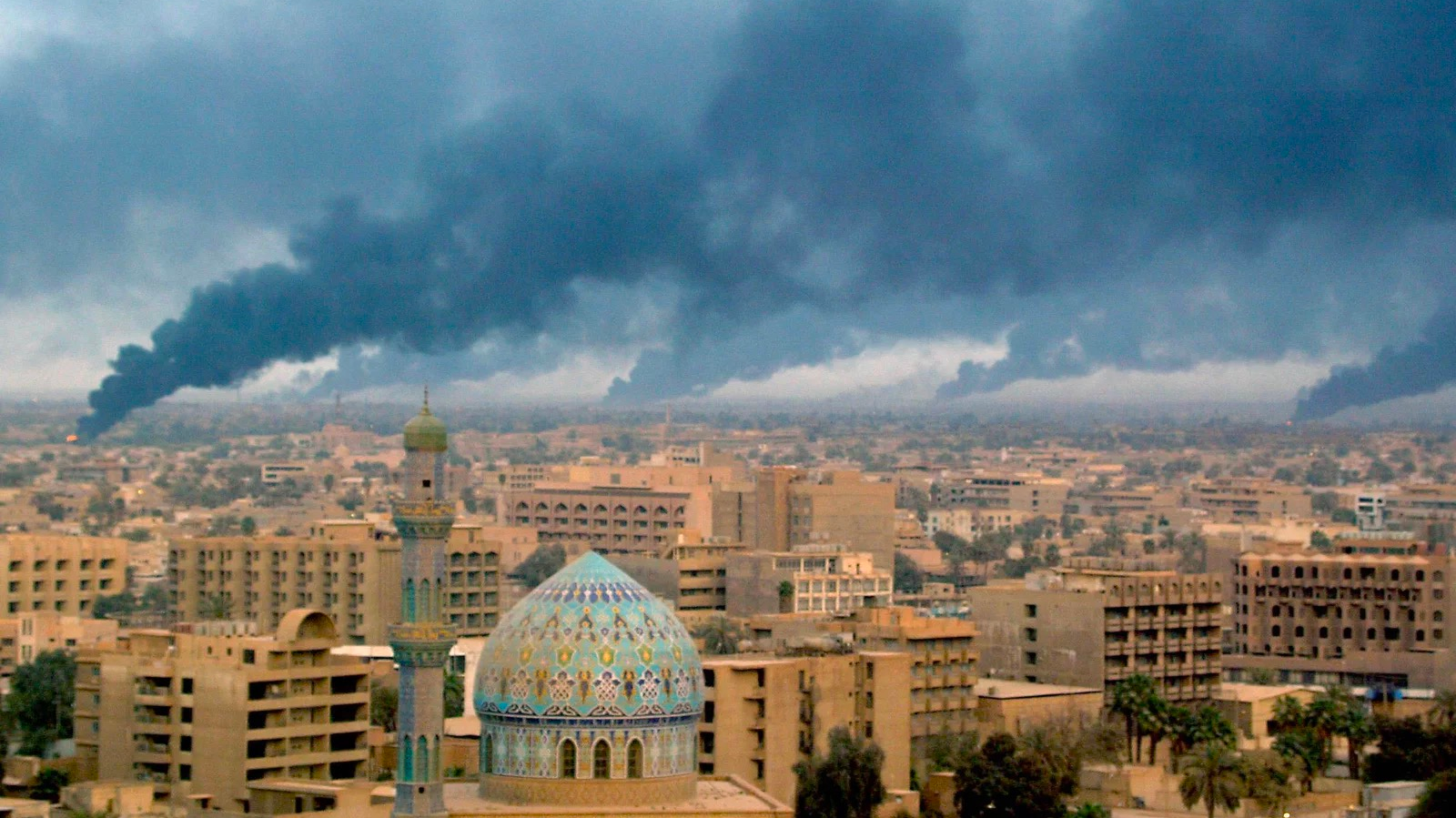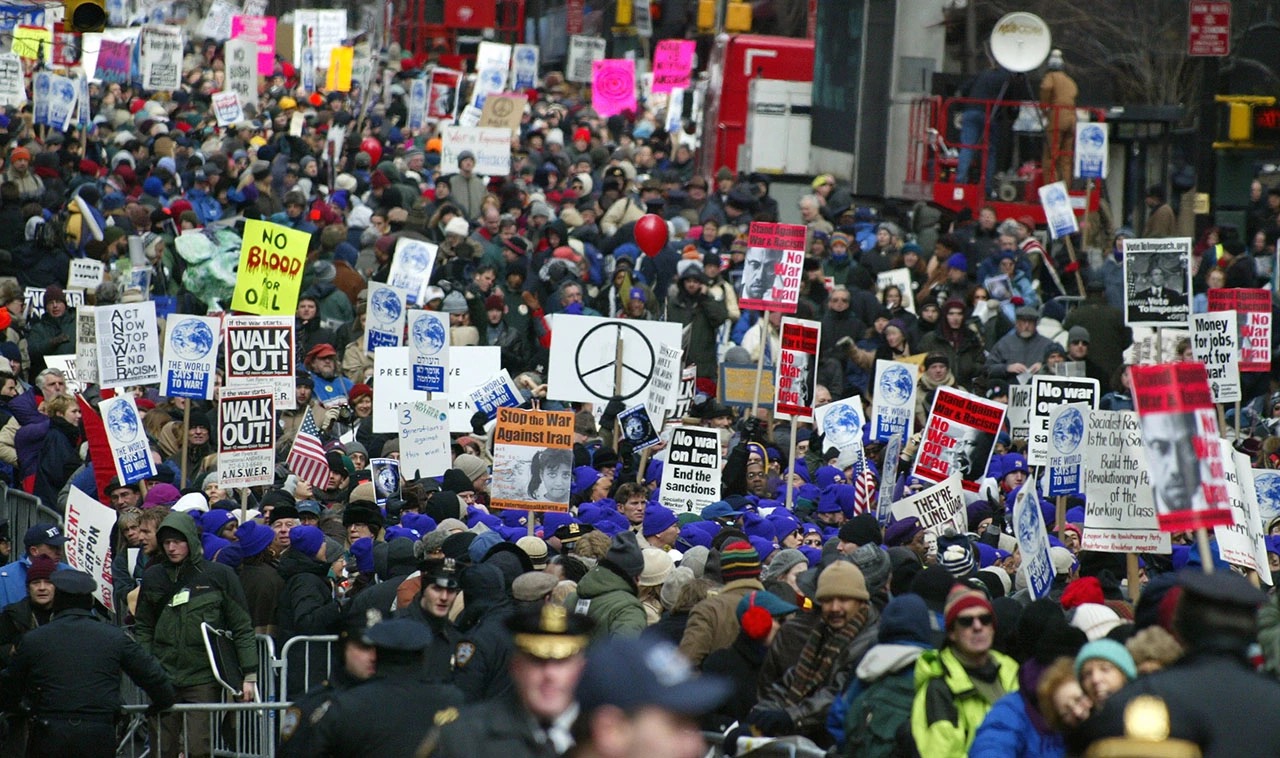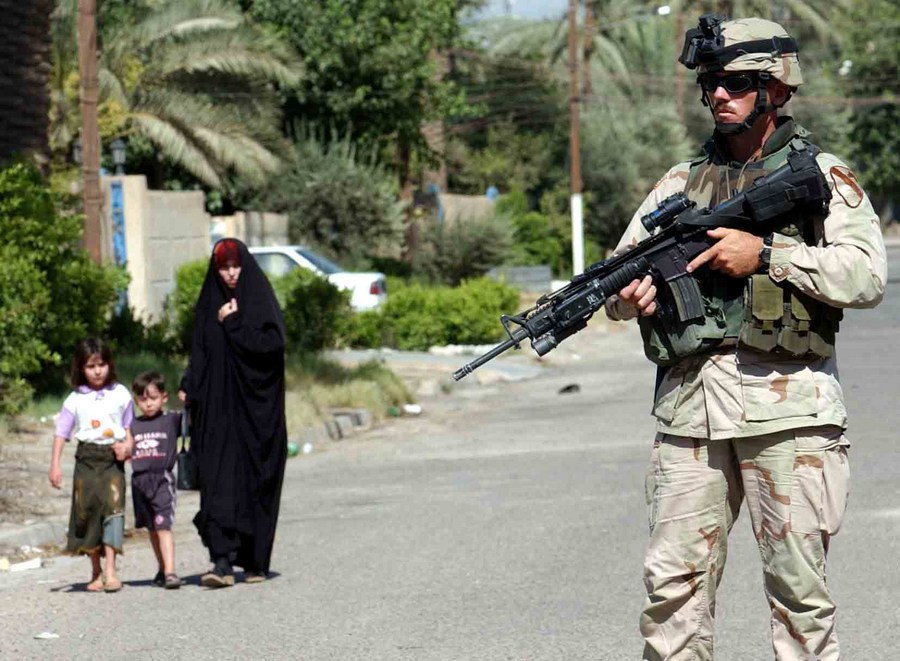
Smoke billowing from burning oil trenches covers Baghdad, Iraq, April 2, 2003. /Getty
Smoke billowing from burning oil trenches covers Baghdad, Iraq, April 2, 2003. /Getty
Twenty years after the Iraq War, its legacy continues to be felt in the country. Tens of thousands of Iraqi civilians died in the war, launched by the U.S. and its allies in March 2003, and few families were left untouched. While reconstruction has progressed, many challenges remain.
More than 2.5 million people, including 1.1 million children, continue to need humanitarian assistance, statistics from the UN show.
While Iraq has made progress in rebuilding its economy and reestablished its place in the international community, many challenges remain, said Duan Jiuzhou, an assistant professor at Tsinghua University's Institute for International and Area Studies.
These challenges include corruption, lack of infrastructure development, and inadequate access to basic resources like electricity and water, he said.
What caused the war?
The war was initially justified by the U.S. based on its claims that Iraq possessed weapons of mass destruction (WMDs) and posed a threat to global security.
"Our mission is clear, to disarm Iraq of weapons of mass destruction, to end Saddam Hussein's support for terrorism, and to free the Iraqi people," said then-President George W. Bush in a radio address in March 2003.
No such weapons were ever found. Many people argue that it was unjustified and based on false pretenses.
The causes of the war "had little to do with fear of WMDs," according to a study by Ahsan I. Butt, an associate professor at the Schar School of Policy and Government at George Mason University.
"A quick and decisive victory in the heart of the Arab world would send a message to all countries, especially to recalcitrant regimes ... that American hegemony was here to stay," argued Ahsan.
In 2005, a presidential commission tasked with investigating WMDs concluded that none of the prewar intelligence judgments on Iraq turned out to be accurate.
In a report to then-President George W. Bush, the commission admitted that the U.S. intelligence community was "dead wrong" in most of its judgments and this was a "major intelligence failure."
"The reality was that I had sent American troops into combat based in large part on intelligence that proved false," wrote Bush in his 2010 memoir, admitting the errors involving the Iraq War and the failure to find WMD there.

Thousands of protesters rally for peace, New York, U.S., February 15, 2003. /Getty
Thousands of protesters rally for peace, New York, U.S., February 15, 2003. /Getty
After the Cold War, the U.S. emerged as the world's sole superpower. Believing that toppling Saddam's regime would help establish a democratic model in the Middle East, the U.S. proceeded with its unilateral action despite facing opposition from the UN, said Duan.
As OPEC's second-largest oil producer, Iraq moved closer to price its oil in euros rather than dollars in 2000. The move threatened U.S. control over the global oil market and precipitated the U.S. action, he added.
"There are indeed some people who harbor resentment towards Saddam Hussein due to the extremely poor economic situation in Iraq after the (first) Gulf War, where the country was under UN-imposed trade sanctions," said Duan.
However, many of Iraq's current problems were brought about by the U.S. occupation.
The invasion opened Pandora's box as the demographics of Iraq are of a multi-ethnic, multi-religious and multi-sectarian nation. The decentralized democratic system has caused political fragmentation, which has yet to be resolved.
The U.S. invasion of a Muslim-dominated Middle Eastern country as a Western, Christian-dominated nation is a highly sensitive issue, noted Duan. It caused resentment among Iraqis and the surrounding Muslim population, which is related to the frequent terrorist attacks.
A failed strategy in the Middle East
Since the fall of Saddam's regime in 2003, Iraq has faced numerous domestic and regional crises that persist today. These crises have been exacerbated by Iraq's pluralistic social structure, which includes a diverse range of sects and ethnicities.
The sectarian violence in the post-Saddam era further fueled the rise of extremist groups, as many Sunni Muslims felt marginalized by the new Shia-led government in Iraq.
"The strategic mistake committed by the U.S. after occupying Iraq was to completely dissolve the Saddam Hussein's Ba'ath Party," said Duan, adding that the Party played a cohesive role in Iraq's governance, and the absence of a unified ruling party led to a state of decentralized governance.
The exiled individuals who opposed Saddam took over Iraq, and for a long time after the war, a suitable governance team could not be found, explained Duan.
The rise of extremist groups like Islamic State is a reminder of the potential consequences of military interventions. As the war created a power vacuum in Iraq, the group seized territory and established a self-proclaimed caliphate, carrying out numerous atrocities.

A U.S. soldier patrols on a street in Baghdad, Iraq, June 29, 2004. /Xinhua
A U.S. soldier patrols on a street in Baghdad, Iraq, June 29, 2004. /Xinhua
During eight years of boots on the ground, more than a million U.S. service members were deployed. Many returned home with physical and mental wounds inluding post-traumatic stress and depression.
Thirty-thousand U.S. veterans have died by suicide in the past two decades, according to Ron Hirschberg, an assistant professor of physical medicine and rehabilitation at Harvard Medical School.
As for economic costs, a 2021 report by Brown University estimates that the combat phase of the war cost around $2 trillion. In a press release accompanying the report, Stephanie Savel, a public anthropologist at Brown University, said that even long after U.S. forces are gone, the U.S. will still be reckoning with the high societal costs of the war.
The bitter legacy hidden underground
During the war, weapons that are restricted by international conventions were employed, including incendiary bombs and white phosphorus munitions, which were used against ground targets in densely populated civilian areas.
Also, the extensive use of depleted uranium (DU) munitions has had long-term negative health effects on local people and resulted in the accumulation of hundreds of tonnes of toxic wastes.
After smashing into a hard target, the DU pulverizes into breathable dust that could remain radioactive for over 4.5 billion years. If exposure is sufficiently high, it could increase the incidence of cancer and damage the kidneys.
According to official data from Iraqi government statistics, before the first Gulf War in 1991, the rate of cancer cases in Iraq was 40 out of 100,000 people. However, by 2005, it had increased to at least 1,600 out of 100,000 people. The increasing trend continues and causes a potential national health crisis for future generations of Iraqis.